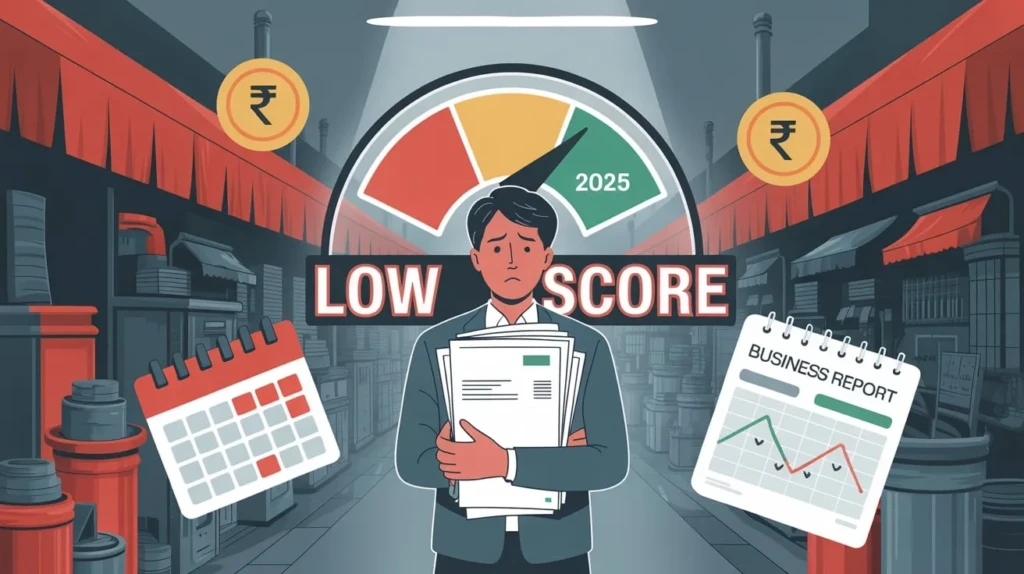In the eyes of lenders, a business isn’t judged only by its profit or turnover—it’s judged by how responsibly it manages its obligations, including payments to vendors and suppliers. In 2025, with trade credit data now being increasingly considered by bureaus and lenders, delayed vendor payments are quietly becoming a key factor that can damage your company’s credit profile and CIBIL MSME Rank (CMR).
This article explains how vendor dues impact your business credit health, how they are tracked, and what you can do to fix or avoid the hidden damage they cause.
What Is a Company Credit Profile?
Your company’s credit profile is a snapshot of its financial behavior as assessed by TransUnion CIBIL, India’s leading credit bureau. This profile includes:
-
Loan repayment history (term loans, OD, CC)
-
Company Credit Report (CCR) details
-
Credit utilization ratios
-
CIBIL MSME Rank (CMR)
-
Inquiries made by banks and NBFCs
-
Now increasingly, trade credit behavior — i.e., how you manage vendor and supplier payments
A poor credit profile doesn’t just affect loans. It affects your ability to:
-
Win tenders
-
Negotiate favorable payment terms
-
Onboard large clients
-
Get limits from vendors or OEMs
And one of the most overlooked threats to this profile is delayed or defaulted vendor payments.
Why Vendor Payments Are Now Tracked
In recent years, RBI has encouraged more transparent reporting of commercial credit transactions. Several bureaus (like CRIF, Equifax, and CIBIL) have begun building Trade Credit Data Exchange Systems in collaboration with:
-
MSME platforms
-
OEM vendors
-
Supply chain financiers
This means vendor defaults—especially those involving registered vendors or listed OEMs—may now be reported to bureaus and appear in your credit profile over time.
→ Read RBI’s push for digital invoice-based trade financing
How Delayed Vendor Payments Affect Your Credit Profile
Let’s break down the consequences:
1. Negative Notation in Trade Credit History
If a vendor reports consistent overdue invoices, that data can reflect as non-financial default in your trade credit profile. This hurts your CIBIL MSME Rank, especially in sectors where credit terms are crucial (e.g., manufacturing, distribution).
→ Trade Credit Definition – Investopedia
2. Blocking of Vendor Credit or OEM Onboarding
Many large vendors now use bureau-backed tools to screen businesses before offering credit terms. If your past dues are visible, you may:
-
Be forced to pay upfront
-
Lose early payment discounts
-
Get removed from supplier programs
3. Impacts in Supply Chain Financing Programs
If you’re working under a supply chain finance model (where banks pay vendors on your behalf), delayed settlements hurt your anchor credibility and may even stop your participation in these programs.
→ Supply Chain Finance Explained
4. Triggers Bureau Alerts or Red Flags
Multiple reports from different vendors over a 90–180 day period may cause bureaus to flag your business profile with “High Payment Risk”, even if loan EMIs are clean.
This becomes especially dangerous when your company is applying for:
-
OD/CC renewals
-
Top-up loans
-
New unsecured limits
Real-World Example
A Delhi-based packaging firm had:
-
CMR Rank 5
-
₹45L annual turnover
-
Regular EMI payments
But the company was rejected for a ₹10L OD renewal because 3 of its registered raw material vendors had flagged overdue invoices of 90+ days in the trade credit network. This lowered its bureau trust profile, even though its financials were solid.
Only after settling vendor payments and submitting proof did the NBFC reconsider—but at a higher interest rate.
How to Know If Vendor Payment Delays Are Affecting Your Credit
1. Download and Review Your CCR
Your Company Credit Report may now include sections for:
-
Trade credit flags
-
Vendor relationship summaries
-
Payment trend insights
While this is still evolving, watch for non-financial remarks or third-party reporting under your PAN/CIN.
2. Check With Your Key Vendors
Ask your top 3–5 vendors if they’ve onboarded with credit rating platforms or MSME digital invoice systems. If yes, your payment behavior is already being observed.
3. Monitor E-invoice Platforms
If you’re using the GST e-invoice portal, delays in payment acknowledgment may be visible through reconciliation tools used by fintechs and vendors.
What to Do If You’ve Been Paying Vendors Late
Even if delays were unintentional, here’s how to reduce the damage:
1. Clear All Outstanding Dues Immediately
Prioritize clearing vendor dues over non-critical expenses. Ensure all payments over 30 days are settled within this quarter to avoid red flags.
2. Get Written Confirmation from Vendors
After settling dues, request payment received acknowledgments or mail confirmations. This can serve as proof in case of disputes.
3. Avoid Settlements or Negotiated Write-offs
Just like loans, settled vendor dues are treated as partial defaults in many reporting systems. Try to pay in full or restructure via mutual agreement and written payment plan.
4. Limit Vendor Credit Inquiries
Some vendors run soft credit checks before increasing limits. Too many such checks within 30 days can increase your inquiry count and may affect your rank.
→ How commercial inquiries impact score – CIBIL FAQs
How CreditCares Helps MSMEs with Vendor Credit Issues
At CreditCares, we help businesses:
-
Analyze their CCR and identify any third-party flags
-
Resolve reported vendor dues
-
Rectify mismatches in CCR reporting
-
Maintain a clean CMR score despite past issues
Our structured approach has helped hundreds of MSMEs become eligible for:
-
Business loans from ₹5L–₹5Cr
-
OD/CC limit enhancements
-
OEM/vendor financing partnerships
FAQs on Delayed Vendor Payments and Credit Impact
Do vendor dues show in CIBIL directly?
Currently, only if reported via platforms connected to CIBIL or fintech-backed bureaus. But coverage is expanding every quarter.
Can vendor disputes lower my CMR rank?
Yes. Even unresolved disputes that appear as outstanding can affect your trade credit profile, and in turn your MSME Rank.
How fast can I fix vendor-related issues in my report?
If settled with proof, corrections usually reflect within 30–45 days after dispute resolution.
Should I negotiate with vendors or pay in full?
Full payments with confirmation are best. Settlements without proper closure often leave a negative remark.
Can I check vendor flags myself?
Currently, vendor reporting is available only in some enhanced bureau versions. We recommend getting a CCR analysis through a consultancy like CreditCares.





